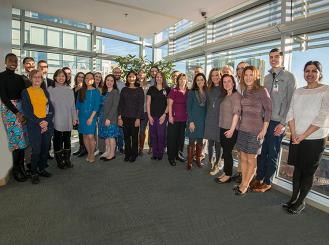Jan 11, 2022
Beverly Moy, MD, MPH, FASCO, recognizes that creating a robust community of successful female scientists will inspire younger women to pursue careers in scientific research. As the clinical director of the Breast Oncology Program, director of community outreach, and a medical oncologist at the Massachusetts General Hospital Cancer Center, she is paving the way for young female scientists working in oncology today.
In addition to this work, Dr. Moy is an associate professor of medicine at Harvard Medical School, where her specific research interests include breast cancer clinical trials and racial and ethnic disparities in cancer care. She is an investigator on multiple research grants examining cancer care equity, including those funded by the Kraft and Trefler Foundations, Merck Foundation, and the National Cancer Institute. Dr. Moy also serves on the board of directors of the Lazarex Cancer Foundation.
She has previously served as the chair of ASCO’s Ethics Committee and Health Disparities Committee, as well as a chair and panelist for multiple breast cancer expert panels. She is the community outreach section editor for the Oncologist and past editorial board member of the National Cancer Institute’s Adult Treatment Patient Data Query. She has also co-authored more than 100 articles in peer-reviewed journals.
Did women in leadership roles inspire your path?
BM: Early in my career, unfortunately, there were few women in leadership positions at my institutions. However, these women have been incredible role models and have taught me valuable skills. During my recruitment to Massachusetts General Hospital right out of oncology fellowship, I met with Nancy Tarbell, MD, who led the Office for Women’s Careers. She gave excellent practical advice on how to succeed in academic medicine. I have also had the privilege of working alongside the amazing Barbara Smith, MD, PhD, for the last 20 years, who is a shining example of a successful breast cancer academic
surgeon and a compassionate clinician.
Additionally, working on ASCO initiatives gave me the opportunity to meet and befriend women in oncology, such as Lisa Newman, MD, MPH, FACS, FASCO; Worta McCaskill-Stevens, MD, MS; and Jamie H. Von Roenn, MD, FASCO, who inspire me to be a strong advocate for all patients with cancer.
What is the greatest hurdle facing women in oncology?
BM: It is difficult to choose the greatest hurdle since there are so many, but we need to acknowledge that the entire structure of health care, academic oncology in particular, is male-dominated. Most of the leaders are men so, therefore, most metrics of success are determined by men. Women in oncology have to be more than just excellent since it is easier for our voices to be ignored.
What can be done to create more parity among men and women in medicine?
BM: We need to start by putting women in leadership positions in all institutions and organizations touching oncology. That includes academic institutions, funders, industry partners, federal agencies, and payor organizations. We also need to create alternate career paths for female early-career investigators. The reality is that childbearing and childrearing stresses create a shift in timeframe for women. Many funding opportunities expire a certain number of years after completing subspecialty training. These, among many other processes, disadvantage women compared to men.
Why is it important to fund the research of female scientists?
BM: Funding female scientists is extremely important in order to start reducing some of the inequities in academic research funding that currently exist. In the long term, creating a robust community of successful female scientists will inspire younger women to pursue careers in scientific research.
How do programs like WWCC elevate women in oncology?
BM: Programs like WWCC create a formal structure for women in oncology to network, create mentorship opportunities, and fund important research driven by women. Since female leadership in local institutions might be lacking, having larger national and international groups of women successfully navigating careers in oncology is desperately needed.
What’s your advice to women entering oncology today?
BM: I love encouraging young women to enter careers in oncology. There is no medical field with more supportive women and men. The possibilities for career paths are endless and include the most exciting basic and clinical research opportunities. Women should know that if they are passionate about any field in medicine, they should go for it. I advise them to surround themselves with supportive people, both inside and outside of the workplace, who value their careers as much as they do.
The Women Who Conquer Cancer series profiles some of the remarkable nominees for Conquer Cancer’s Women Who Conquer Cancer Mentorship Awards, which recognize role models and mentors to men and women training to be cancer clinicians, educators, or researchers.

